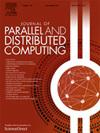HeaPS: Heterogeneity-aware participant selection for efficient federated learning
IF 4
3区 计算机科学
Q1 COMPUTER SCIENCE, THEORY & METHODS
引用次数: 0
Abstract
Federated learning enables collaborative model training among numerous clients. However, existing participant/client selection methods fail to fully leverage the advantages of clients with excellent computational or communication capabilities. In this paper, we propose HeaPS, a novel Heterogeneity-aware Participant Selection framework for efficient federated learning. We introduce a finer-grained global selection algorithm to select communication-strong leaders and computation-strong members from candidate clients. The leaders are responsible for communicating with the server to reduce per-round duration, as well as contributing gradients; while the members communicate with the leaders to contribute more gradients obtained from high-utility data to the global model and improve the final model accuracy. Meanwhile, we develop a gradient migration path generation algorithm to match the optimal leader for each member. We also design the client scheduler to facilitate parallel local training of leaders and members based on gradient migration. Experimental results show that, in comparison with state-of-the-art methods, HeaPS achieves a speedup of up to 3.20× in time-to-accuracy performance and improves the final accuracy by up to 3.57%. The code for HeaPS is available at https://github.com/Dora233/HeaPS.
高效联邦学习的异构感知参与者选择
联邦学习支持在众多客户之间进行协作模型训练。然而,现有的参与者/客户选择方法未能充分利用具有优秀计算或通信能力的客户的优势。在本文中,我们提出了一种新的异构感知参与者选择框架,用于高效的联邦学习。我们引入了一种细粒度的全局选择算法,从候选客户中选择沟通能力强的领导者和计算能力强的成员。领导者负责与服务器沟通,以减少每轮持续时间,以及贡献梯度;同时成员与领导进行沟通,将高效用数据获得的梯度更多地贡献给全局模型,提高最终模型的精度。同时,我们开发了一种梯度迁移路径生成算法来匹配每个成员的最优领导者。我们还设计了客户端调度程序,以促进基于梯度迁移的领导者和成员的并行本地培训。实验结果表明,与目前最先进的方法相比,该方法的时间精度比(time-to-accuracy)性能提高了3.20倍,最终精度提高了3.57%。堆的代码可在https://github.com/Dora233/HeaPS上获得。
本文章由计算机程序翻译,如有差异,请以英文原文为准。
求助全文
约1分钟内获得全文
求助全文
来源期刊

Journal of Parallel and Distributed Computing
工程技术-计算机:理论方法
CiteScore
10.30
自引率
2.60%
发文量
172
审稿时长
12 months
期刊介绍:
This international journal is directed to researchers, engineers, educators, managers, programmers, and users of computers who have particular interests in parallel processing and/or distributed computing.
The Journal of Parallel and Distributed Computing publishes original research papers and timely review articles on the theory, design, evaluation, and use of parallel and/or distributed computing systems. The journal also features special issues on these topics; again covering the full range from the design to the use of our targeted systems.
 求助内容:
求助内容: 应助结果提醒方式:
应助结果提醒方式:


